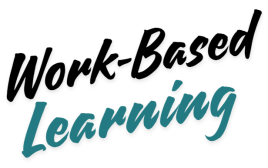Work-Based Learning

Work-based learning integrates classroom instruction with hands-on experience in professional settings, such as apprenticeships, internships, and job shadowing. It allows students to apply theoretical knowledge practically, gaining real-world insights and bridging academic study with professional practice. Participating enhances career development by providing firsthand industry experience, fostering skill development, and building professional networks. It also helps individuals explore various roles, identify strengths, and make informed career decisions, thereby gaining a competitive edge in the job market.
Internships
What is an Internship?
An internship is a structured, short-term work experience offered by companies and organizations to provide students or recent graduates with practical exposure to a specific field or industry. Internships allow participants to apply classroom knowledge to real-world scenarios, gaining hands-on experience under the supervision of experienced professionals. Internships can be paid or unpaid and last from a few weeks to several months.
Why Participate in an Internship?
Participating in an internship can bridge the gap between academic studies and the professional world, providing you with firsthand experience in your chosen field. They offer a unique opportunity to explore different career paths, understand industry culture, and make informed decisions about your future. Internships also help you build a professional network, enhance your resume, and develop essential skills that are highly valued by employers.
Types of Internship Opportunities
Paid Internships (Non-Credit) - See Career Services for Assistance
- Interns receive monetary compensation for their work
- Provides financial support, often more competitive, and offers real-world job experience
Academic Internships (Credit-based that are Paid and Non-Paid) - See the Academic Department related to the internship.
- Internships that are part of an academic program and often provide academic credit
- Integrated with a students coursework, helping them apply academic knowledge in a practical setting while earning credits towards their degree
Unpaid Internships (Credit and Non-Credit) - See Center for Community & Civic Engagement for Assistance
- Interns do not receive monetary compensation but gain valuable experience
- May offer more flexibility and opportunities in non-profit or volunteer sectors, and can still provide important industry experience and networking opportunities
Types of Work-Based Learning - See Center for Community & Civic Engagement for Assistance
Service Learning
- Combines community service with academic learning objectives.
- Encourages civic responsibility and allows students to apply academic skills to address community needs.
Please see Approved Service Learning Sites.
Unpaid Internships (Credit and Non-Credit)
- Interns do not receive monetary compensation but gain valuable experience
- May offer more flexibility and opportunities in non-profit or volunteer sectors, and can still provide important industry experience and networking opportunities
Learn more about Service Learning and the various components, please visit the Center for Community & Civic Engagement websites under Services Learning.


